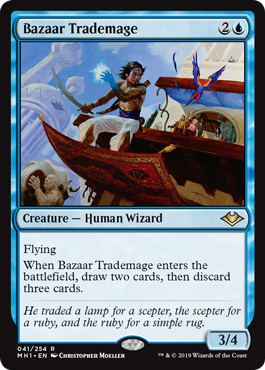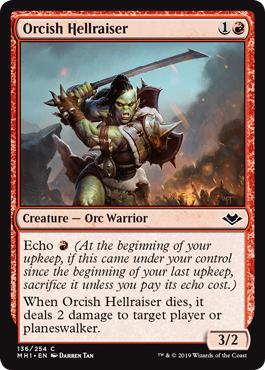Another release weekend is on the horizon, and as it approaches, the only thing that seems to get any clearer is that this is a very complicated set. But as always, we’re here to help! After puzzling over and evaluating the set, we’ve come up with what triggers to look out for, and more importantly, how we arrived at our decision for each of them. It’s a list longer than your arm, so we’ll hop right into it below.
In Modern Horizons, fourteen (!!!) cards have triggers that upgrade when missed:
“When Alpine Guide leaves the battlefield, sacrifice a Mountain.”
Starting things off strong, Alpine Guide fetches us a land, which is great! Then it blows up a land. Less great. This trigger is Generally Detrimental. And an important note here; this is not a trigger that undoes a zone change, since the two triggers are entirely independent of each other. Keep that in mind when applying remedies.
“When Aria of Flame enters the battlefield, each opponent gains 10 life.”
Fairly straightforward one; giving an opponent more life usually doesn’t help a player.
“When Bazaar Trademage enters the battlefield, draw two cards, then discard three cards.”
This trigger does give its controller the ability to filter bad cards out of their hand, and it’s built to resemble Bazaar of Baghdad, which people play specifically for this effect. Good, right? Well, no. When evaluating a card, we don’t care about what other cards or keywords are in a deck, interacting with it; we only look at this one. And a player discarding more than they draw means ending up with fewer resources overall.
“Vanishing: … At the beginning of your upkeep, remove a time counter from it. When the last is removed, sacrifice it.”
Both of those triggers are Generally Detrimental for their controller; sacrificing a creature is obviously not great, and ticking down time counters (with nothing else on the card generating value when that happens) only serves to push them closer to sacrificing it.
5 & 6. Dregscape Sliver & First-Sphere Gargantua
“Unearth: … Exile it at the beginning of the next end step.”
Unearth only has one trigger, but it’s a doozy. Exiling creatures is rarely a good thing, and neither of these cards do anything to make it any better. Don’t forget that this trigger undoes a zone change; so it’ll never go “out of window” for a remedy. The opponent will get to choose whether the exiling happens immediately when it’s discovered, or just before anyone gets priority next phase.
“Sacrifice those tokens at the beginning of your next upkeep.”
Keeping tokens is usually better business then losing them, and this card doesn’t do anything to change our minds on that. This trigger also trips the undo a zone change part of the remedy, so those tokens are definitely leaving the battlefield at some point.
“At the beginning of the end step, sacrifice Lightning Skelemental.”
Fairly simple, this trigger hurts more than it helps. It shouldn’t often be missed, since this creature draws a lot of attention when it’s on the battlefield; but even if it is missed it’ll always be within the window for a remedy, since it triggers every end step.
“Echo: At the beginning of your upkeep, if this came under your control since the beginning of your last upkeep, sacrifice it unless you pay its echo cost.”
‘Pay this cost or else your creature dies’. Ransoming, huh? Don’t forget, the “default action” clause of Missed Triggers has been removed, so if this trigger is remembered less than a turn later and the opponent chooses to put it on the stack, the controller does still get to decide which option they want: to pay the ransom, or let their Orc die.
“Sacrifice it at the beginning of the next end step.”
Hey, now Planeswalkers can Sneak Attack just like creatures! Well, losing them at the end step obviously isn’t as good as keeping them around. More importantly, this trigger undoes the zone change at the beginning of this ability, so there will always be a remedy to apply (unless that Planeswalker has already left the plane, either on their own or because someone’s creatures “helped”).
“At the beginning of your upkeep, Ravenous Giant deals 1 damage to you.”
A plain and simple trigger, for… Well, a plain and simple creature.
12 & 13. Treetop Ambusher & Viashino Sandsprinter
“(Dash:) At the beginning of the end step, return (this card) to its owner’s hand.”
Treetop Ambusher’s Dash, and the Sandsprinter who is just naturally quite dashing, look fairly similar; in fact, they use mostly the same language. But even though they are handled the same, it’s for slightly different reasons.
Both triggers will always get a remedy. For the Sandsprinter, that’s because like the Skelemental, its ability triggers every turn; it’s never outside the window for applying a remedy. The Ambusher’s trigger on the other hand is a delayed trigger that undoes its zone change. That means it qualifies for an exception: the remedy never expires, we just ask the opponent if it’s resolving immediately or at the start of the next phase. A very keen eye might spot minor wording irregularities between this and other “self-destruct” triggers, since the keyword that creates the trigger is what’s being used to cast it but it’s resolving the spell that changes its zone. Despite that, we group this with “undoing a zone change” because consistent remedies build better player understanding and trust, and because the difference is more of a loophole than an intended division.
And, last but certainly not least:

“Evoke: … If you do, it’s sacrificed when it enters the battlefield.”
For those who’ve been keeping track, this may look like an odd inclusion. Back in our Ultimate Masters guide, we labeled Reveillark as having a Not Generally Detrimental trigger, breaking from every other card with Evoke. So, it seems reasonable that since this card is a baby ‘lark, it might follow the same path.
However, there’s one extremely crucial difference. When you Evoked Reveillark, the cost for the creature increased; with Vesperlark, the cost decreases. This may not seem like a huge deal, since the rest of the arguments are the same. But consider what happens if a player forgets to sacrifice their Vesperlark: for some amount of time, they get to play with a two mana 2/1 flier. A stronger creature than was intended, since it normally costs three. For the same reasons as Treetop Ambusher above, this trigger doesn’t undo a zone change, so Versperlark will stick around if we don’t catch the error within one turn cycle. And whenever it does get around to leaving the battlefield, the player still gets that trigger; the only value they’ve lost is the immediacy of it, but that’s a whole lot less important than whether or not it happens.
So this player would still be getting full or nearly full value from the card, in addition to having a creature on board for some amount of time that cost them less than WoTC intended. With that in mind, we made the determination that having a body on board for longer than it should be, at less mana than it should cost, and still getting back a 1 or less power creature later, is generally preferable to just getting that creature back now. Especially because we’re evaluating this card in a vacuum; and in a vacuum, a 2/1 flier is definitely better to have than a 1 or less power creature. This trigger is Generally Detrimental, like nearly every other “Evoke: … sacrifice” trigger.
Whew! That was a marathon. But we’re not quite done yet. There’s one more card we wanted to talk about today, because its trigger doesn’t upgrade, but it is a strange one:
Blizzard Strix

“When Blizzard Strix enters the battlefield, if you control another snow permanent, exile target permanent other than Blizzard Strix. Return that card to the battlefield under its owner’s control at the beginning of the next end step.”
Blizzard Strix flickers other permanents! That’s pretty cool. And, wait… It naturally has Flash, too? Hmm. That expands what this card can do, quite a bit. Even without examining things like “extra value from enter the battlefield effects/keeping Evoked creatures/etc”, since that would require us to evaluate abilities of other, hypothetical cards (and not just this one in a vacuum). But as often as it can temporarily remove an opponent’s creatures from the battlefield, it can also rescue a player’s own creatures, untap a spent land or a creature that attacked, reset Planeswalkers or reattach auras… And if a player exiles their opponent’s permanent, they’re usually fine with it not coming back. For their own, they usually do want it back.
We considered whether or not to treat the “return that card” delayed trigger as symmetrical, and either apply the Warning upgrade or not depending on whose permanent left. But that stretches our definition of “symmetrical” quite a bit; the current use of that term is for triggers that happen multiple times a game, sometimes for one player, sometimes for the other. This trigger happens exactly one time, to exactly one player. As policy evolves our definitions may change, but for now, this is where it lies.
Because this trigger isn’t symmetrical, and because it doesn’t quite reach the bar for Generally Detrimental (since it has reasonable, playable applications pointing at its controller’s own permanents, even without evaluating abilities on those other cards), that means it must be Not Generally Detrimental. This trigger does undo a zone change, so if you notice that it’s missed please do step in and apply the remedy. But missing this trigger shouldn’t ever result in a Warning.


